Is Governor Ravi acting without informing/consulting the Centre, or is the BJP leadership unsure of what to do with the DMK in Tamil Nadu? asks N Sathiya Moorthy.
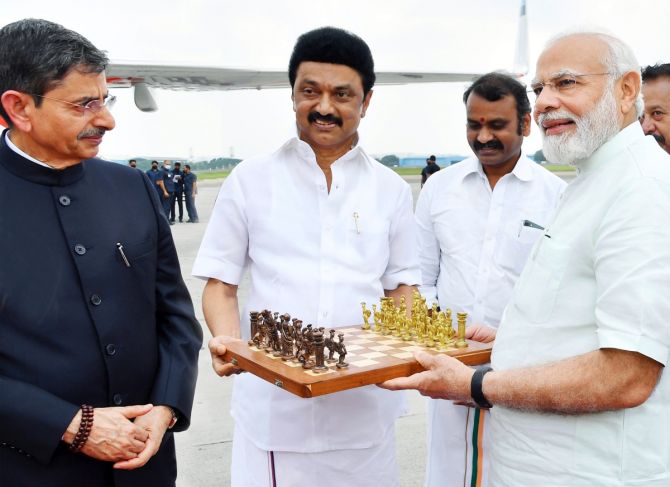
Only one of the two conclusions comes to mind when discussing Tamil Nadu Governor R N Ravi's quick about-turn(s) in relation to jailed minister Senthil Balaji.
That he took two U-turns in as many weeks in the matter of having the minister sacked without Chief Minister M K Stalin's consent may go against him despite his hurried actions standing proof to his sworn commitment to upholding Constitutional morality and probity in public life, may not hold water in the larger context.
When reports last came in, Ravi had sacked Balaji and withdrawn it, too.
Earlier, he had retracted his decision to sack Balaji through a single statement from Raj Bhavan, which however approved of Stalin's 'aid and advice' to re-allocate his portfolios between two cabinet colleagues.
By the same advice, Stalin had allowed Senthil Balaji to continue as 'minister without portfolio', which some say is a 'constitutional anachronism' while others refer to the precedent set by Lal Bahadur Shastri when the upright leader accepted a similar position in then prime minister Jawaharlal Nehru's Cabinet in the early 1960s.
Once Stalin notified Balaji's continuance as 'minister without portfolio' through a government order, Ravi promptly discarded his earlier decision, thus making the current retraction, a two-in-a-row affair.
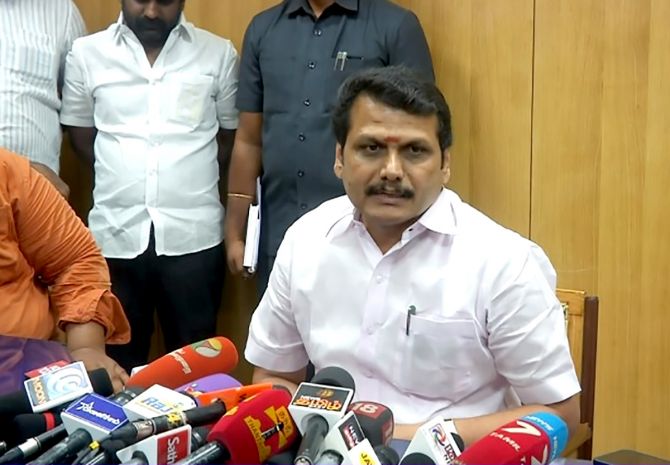
Going beyond multiple legal issues involved in the Enforcement Directorate's arrest and possible prosecution of Senthil Balaji lies the larger Constitutional and political question: Is Ravi acting without informing/consulting the Centre under Prime Minister Narendra Modi, especially Raj Bhavan's reporting authority in the union home ministry under the inimitable Amit Shah, or is the BJP leadership at the Centre still unsure of what to do with the ruling DMK in Tamil Nadu?
Indications are that the former may be closer to the truth, as the Centre if it had advised or approved of Ravi's initiatives, would have done its Constitutional homework on such sensitive matters with which the higher courts in the country easily gets upset about.
In this case, the Madras high court has already fixed for July 7, hearing on petitions challenging Balaji's continuance as minister after his arrest and continuance in judicial custody, now extended up to July 12.
This is only one part of the story. Legal opinion is at best divided if the governor could act on his own in matter of sacking an incumbent minister.
Though the Supreme Court had ruled that the 'appointing authority' had the power to 'sack' ministers, incidentally in the case of Stalin's late chief minister father M Karunanidhi, as far back as the late 1970s, the apex court has ruled otherwise in many other cases.
From this would flow a basic question: 'If the governor is the appointing authority and has the power to sack ministers either without seeking the chief minister's advice or over-ruling such advice, why is there the Constitutional provision that the governor shall act according to the 'aid and advice' of the chief minister, or the council of ministers under the chief minister?
According to this school, any construct other than the one specifically mentioned in the Constitution has the implied potential to make the governor an 'autocrat under the law'.
If this was not the intent of the Constitution, and the spirit of the nation's democratic norms and scheme, then the governor would have to have no choice in the matter, to call his own -- whether official or personal.
Already, there is the theoretical possibility of the President becoming a 'Constitutional autocrat', by appointing a person of his choice as prime minister, and on his/her advice, appoint a council of ministers, which could then promptly recommend the proclamation of Emergency, dissolution of the Lok Sabha and the 'suspension' of the Rajya Sabha, which again could not be challenged in the Supreme Court as 'fundamental rights' had already been suspended.
It could then be the Indian equivalent of the 'blue-eyed babies' case, a technical anachronism under the British scheme that has no place in modern times.
The question is about British Parliament having the power to legislate that all blue-eyed babies should be killed, and courts having to decide on the matter. The answer for the latter is as clear as the impossibility of the former.
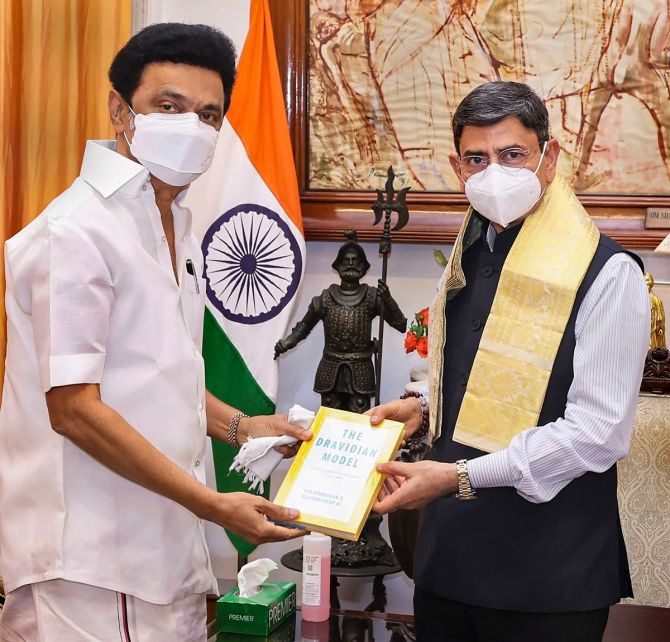
According to news reports, the Centre has since advised Ravi to consult the attorney general before proceeding in the matter, hence his current retraction.
Does it imply that the Centre was unconcerned when Ravi made a similar U-turn earlier on the same issue?
This raises the further question if the governor has exceeded his political brief when being despatched to the Chennai Raj Bhavan, or he was told nothing, or has been exceeding his brief, and consistently and persistently so.
Some in the ruling DMK hierarchy may feel satisfied with news reports of the kind, to imply that the Centre was not behind Ravi's moves, which do not stop with la affaire Senthil Balaji.
The cadre and at times public perception is only one of two things -- either the ruling BJP at the Centre is behind it all, or the party does not know how to handle the state government and Stalin, especially after the latter became the first one to have central agencies challenged in courts for their actions, and allegations of procedural failures, which courts often frown upon in such matters.
However, a pointed reference is being made to Ravi mentioning in his Thursday's sack order, terms that have far-reaching Constitutional import.
'There are reasonable apprehensions that continuation of Thiru V. Senthil Balaji in the council of ministers will adversely impact the due process of law including fair investigation that may eventually lead to breakdown of the constitutional machinery in the state,' is what the Raj Bhavan statement said about Balaji's sacking.
According to some Constitutional experts, by deploying phrases such as 'due process of law' and more importantly, 'breakdown of the constitutional machinery', the governor was possibly referring to the possibility of recommending President's rule in the state at some point in time, citing the standardised causes used in such other dismissals in the past.
In the same vein, they also point to the Supreme Court verdict in the S R Bommai case, (1994), which prohibits such dismissals, which go in for suo motu judicial review.
If nothing else, the BJP centre cannot take the risk of a negative verdict in the run-up to multi-state assembly polls in the coming months, peaked by the LS elections next summer.
This raises the question if Ravi was seeking and obtaining appropriate Constitutional advice before acting in these and other matters pertaining to the DMK state government and chief minister, or is being led/misled by local political and ideological guides of one kind or the other.
In particular, it also raises questions about the level and nature of communication between the Chennai Raj Bhavan and the Centre (read: Home ministry).
Hence, the question arises if the governor has lost, or is taking pains to lose the confidence of the President, which again under the Constitution refers only to the council of ministers under the prime minister.
Though not every power of the Union council is transferred to the state ministry in context, these are also basic to the effective functioning of the Constitutional scheme, where one Constitutional institution is not seen as being overly and overtly interfering in the daily affairs of the government under the chief minister.
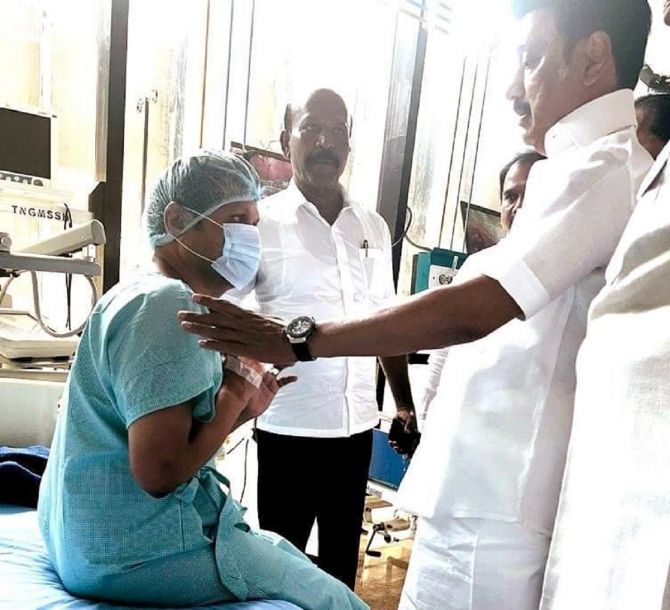
For all this, however, the governor's counsels may have taken their position from the Supreme Court directing the ED to investigate Senthil Balaji in a 'transport corporations' recruitment scam', dating back to his days in the erstwhile AIADMK ministry of late chief minister Jayalalithaa, in 2014.
The Raj Bhavan's sack note also refers to other cases and investigations against the minister.
Yet, politically, it may pay the BJP better dividends if the ED and other central agencies are able to 'expose' Senthil Balaji, his political bosses and others in the open courts than an over-enthusiastic/over-anxious governor taking precipitate action that could backfire electorally, too.
Such a construct would imply that problems of the central agencies kind might have only begun for the DMK ministers and leaders in Tamil Nadu.
Yet, there could be more embarrassing moments for the ED in the courts in Tamil Nadu as Senthil Balaji's wife Megala has since filed an additional affidavit, attributing it all to the state BJP chief K Annamalai's political animus against her husband, who is now recuperating from a post-arrest emergency heart-surgery under jailers' watch.
The fact of the surgery has made the ED look vindictive after it had argued in the Madras high court that the minister was faking a heart problem when none possibly existed.
Wife Megala's habeas corpus petition also claimed that the ED did not follow the letter and spirit of the laws and court ruling sin the matter of search and arrest operations, and hence should be held 'illegal'.
The division bench that heard the case has since reserved the verdict, which when pronounced, might well be challenged in the Supreme Court -- wherever is the loser.

This apart, the fact that the ED flew in Solicitor General Tushar Mehta from Delhi, not stopping with the additional SG, based in Chennai, to argue its case in the Madras high court too has not gone unnoticed.
While a section of the social media has pointed to the Balaji side flying in former attorney general Mukul Rohatgi, purportedly paying him very high for daily sittings, others have claimed that the BJP Centre's vindictiveness stands out if one only looked at the need and urgency with which it had allowed the ED to rope in the SG, personally.
Then, of course, there is the larger Constitutional question, especially for Ravi to muse.
Granted that he gets the right and power to sack Balaji from a court verdict, now or later, what if Stalin names Balaji's wife Megala as a minister. Can the governor decline to swear her in, as his current argument is that Balaji, continuing as minister (even if in a hospital jail, can 'influence' investigations into his case?
If such is the case, Megala, having filed the habeas corpus petition, too, can be construed as being intent on influencing investigations into her husband's case.
While politically it will be suicidal for Stalin to take the course, it would still be Constitutionally tenable for him to do so.
That is where the BJP's chances too are, not in the ways Ravi is talking and acting -- or, so it seems.
N Sathiya Moorthy, veteran journalist and author, is a Chennai-based policy analyst and political commentator.
Feature Presentation: Rajesh Alva/Rediff.com








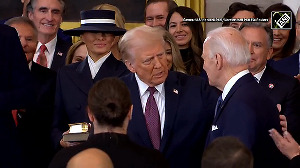
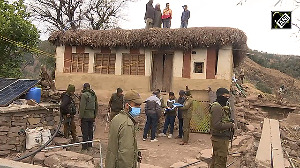

 © 2025
© 2025